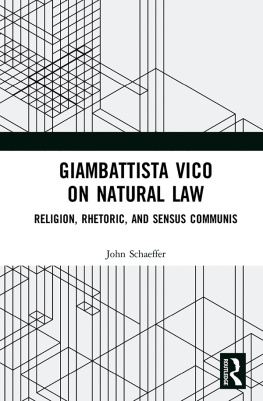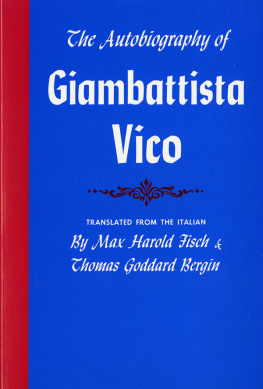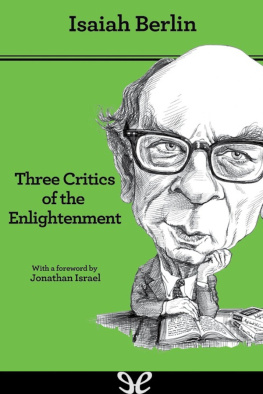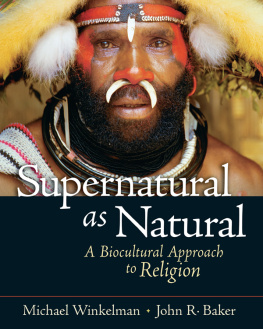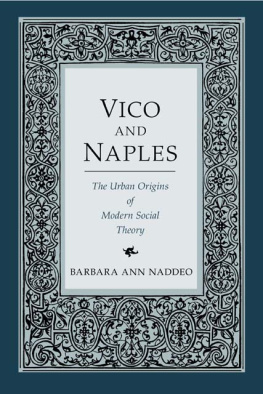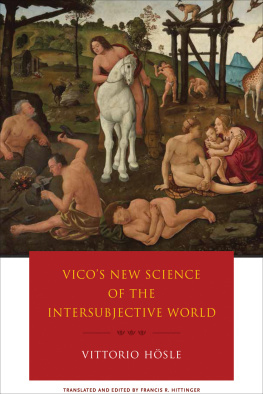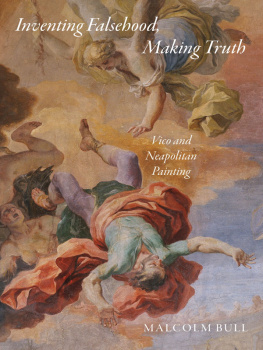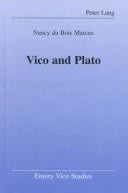Giambattista Vico on Natural Law
This book introduces the thought of Giambattista Vico (16681744) into the discussion about natural law.
For many critics, natural law is not natural but a faade behind which lurks the supernaturalthat is, revealed religion. While current notions of natural law are based on either Aristotelian/Thomistic principles or on Enlightenment rationalism, the book shows how Vico was the only natural law thinker to draw on the Roman legal tradition, rather than on Greek or Enlightenment philosophy. Specifically, the book addresses how Vico, drawing his inspiration from Roman history, incorporated both rhetoric and religion into a dynamic concept of natural law grounded in what he called the sensus communis: the entire repertoire of values, images, institutions, and even prejudices that a community takes for granted. Vico denied that natural law could ever furnish a definitive answer to moral problems in the social/public sphere. Rather he maintained that such problems had to be debated in the wider arena of the sensus communis. For Vico, as this book argues, natural law principles emerged from these debates; they did not resolve them.
John Schaeffer is Emeritus Professor of English at Northern Illinois, US.
First published 2019
by Routledge
2 Park Square, Milton Park, Abingdon, Oxon OX14 4RN
and by Routledge
52 Vanderbilt Avenue, New York, NY 10017
a GlassHouse book
Routledge is an imprint of the Taylor & Francis Group, an informa business
2019 John Schaeffer
The right of John Schaeffer to be identified as author of this work has been asserted by him in accordance with sections 77 and 78 of the Copyright, Designs and Patents Act 1988.
All rights reserved. No part of this book may be reprinted or reproduced or utilised in any form or by any electronic, mechanical, or other means, now known or hereafter invented, including photocopying and recording, or in any information storage or retrieval system, without permission in writing from the publishers.
Trademark notice: Product or corporate names may be trademarks or registered trademarks, and are used only for identification and explanation without intent to infringe.
British Library Cataloguing-in-Publication Data
A catalogue record for this book is available from the British Library
Library of Congress Cataloging-in-Publication Data
Names: Schaeffer, John D., author.
Title: Giambattista Vico on natural law: religion, rhetoric and sensus communis / John Schaeffer.
Description: Abingdon, Oxon; New York, NY: Routledge, 2019. |
Includes bibliographical references and index. |
Identifiers: LCCN 2018058364 (print) | LCCN 2018058946 (ebook) |
ISBN 9780429201042 (ebk) | ISBN 9780367191061 (hbk)
Subjects: LCSH: Vico, Giambattista, 16681744. | Natural law.
Classification: LCC K457.V5 (ebook) | LCC K457.V5 S33 2019 (print) | DDC 340/.112dc23
LC record available at https://lccn.loc.gov/2018058364
ISBN: 978-0-367-19106-1 (hbk)
ISBN: 978-0-429-20104-2 (ebk)
Typeset in Galliard
by codeMantra
This book could not have been written without the assistance of the National Endowment for the Humanities. The Endowments generous research grant enabled me to begin writing free of other duties and so gain an initial momentum which, even if it temporarily flagged, saw me through to the end of the project.
I must also acknowledge the intellectual foundation and inspiration provided by Walter J. Ong S.J., Donald P. Verene, and Charles H. Long. Walter Ongs insights into rhetoric, and the tension between writing and orality that inhabits it, provided the intellectual agenda for my career. Donald P. Verene has provided me with a continual flow of insights by allowing me to participate in his seminars and colloquia on Vichian subjects. Finally, Charles H. Long introduced me to the thought of Giambattista Vico in his 1977 NEH seminar. He encouraged me to see Vico within the context of the history of rhetoric, advice I have followed ever since. And it was during this seminar that I met my future wife, Dr. Laura Bird, to whose unwavering support, encouragement, and love I owe everything.
This book introduces the thought of Giambattista Vico into the discussion of, and controversy about, natural law. My claim is that Vico showed that natural law is something that must be continually argued about and not merely argued from. Vico tackled the problem that has occupied natural law scholars for decades: What is the relation of the natural law as a philosophically grounded moral code to the ius gentium, the laws and customs common to every human society. What we now call natural law Vico referred to as the natural law of the philosophers, distinguishing it from the values and practices shared by most human societies which he called the ius gentium, the traditional name given by the Roman jurists and used in Vicos time and still in our own. I maintain that Vico grounded a relationship between these two natural laws in what he called the sensus communis, a consensus of value and meaning that lies deeply imbedded in the culture, institutions, and language of a community. The ius gentium, Vico argues, is constantly developing amid social changes that frequently cause conflict and even violence. The ius gentium emerges from political and even religious negotiations. It results from argument and eloquence. Only later, when alphabetic literacy permits reflective, self-conscious rationality, does the natural law of the philosophers emerge.
I claim that Vico showed that these arguments about equity (and ultimately about the natural law of the gentes) must take place within the sensus communis. The natural law of the philosophers emerges from reflection upon the ius gentium. Thus, a Vichian theory of natural law is never complete; the relation of philosophical natural law to the ius gentium means that as new circumstances require development and change in concrete social institutions and the mores that support them, so the philosophical natural law is constantly under pressure for revision. Finally, in Vicos theory, natural law is never secure. It is always under threat from the selfishness and ignorance of human beings in a human society, a threat Vico called the barbarism of reflection.
The Introduction to every book on Giambattista Vico observes how, within the last thirty years, Vicos thinking has entered virtually every intellectual field: history, philosophy, political science, sociology, psychology, linguistics, literary criticism, pedagogy, and even law. The latter, however, has received less attention than most of the others, and this is especially ironic because Vico entitled the first version of his New Science the principles of a New Science of the nature of thenations through which the principles of a new system of the natural law of the gentes is discovered. Vico sees his work as leading to a new system of natural law, yet this aspect of Vicos thought has been comparatively ignored. Donald R. Kelley is one of the few who have brought Vico into discussions of natural law and legal history. This book continues this project by analysing Vicos idea of sensus communis, with its rhetorical and religious (but not theological) approach to natural law and contrasting it with the Christian and rationalistic approaches that have dominated natural law thinking for centuries.
I was introduced to the thought of Giambattista Vico by Charles H. Long, then professor of Religious Studies at the University of North Carolina at Chapel Hill. Vico, he said, is a continent, and for the last forty years I have seen this judgement verified over and over. I, and many others, landed on Vico and then made our way into the interior, following whatever path we found on the shore. Occasionally, the paths crossed, but just as often the reader of Vico follows his own path, leaving the rest of Vicos thought in the dark. Croce followed the path of philosophical idealism; Leon Pompa, inspired by Nicola Badaloni, followed a scientific path, weighing Vicos claims to have constructed a new science. Marcel Danesi, Jrgen Trabant, and Davide del Bello have investigated Vicos contribution to linguistics. I and Michael Mooney took the rhetorical path, trying to understand Vico in the tradition of classical and Renaissance rhetoric. More recent scholarship has also taken these paths but branched off to other destinations. Mark Lilla took the scientific path and claimed that it leads to a Vico who maintained a religious outlook on history and who repudiated scientific modernity and its optimistic claims about human nature and civilization. Barbara Ann Naddeo, seeking to refute Lilla, claims that Vico did indeed find a new science, social science. David Marshall also takes the rhetorical path and explains Vicos whole career as a sublimation of rhetoric, that is, Vico articulated a philosophical system that was an idealized version of classical rhetoric. Donald P. Verene, perhaps the foremost Vico scholar writing in English, has placed Vico in the tradition of Western philosophy, claiming that Vico returned to a philosophy of the whole, a comprehensive, metaphysical, treatment of history aimed at guiding its readers to a life of prudencea survival guide for modern man.

